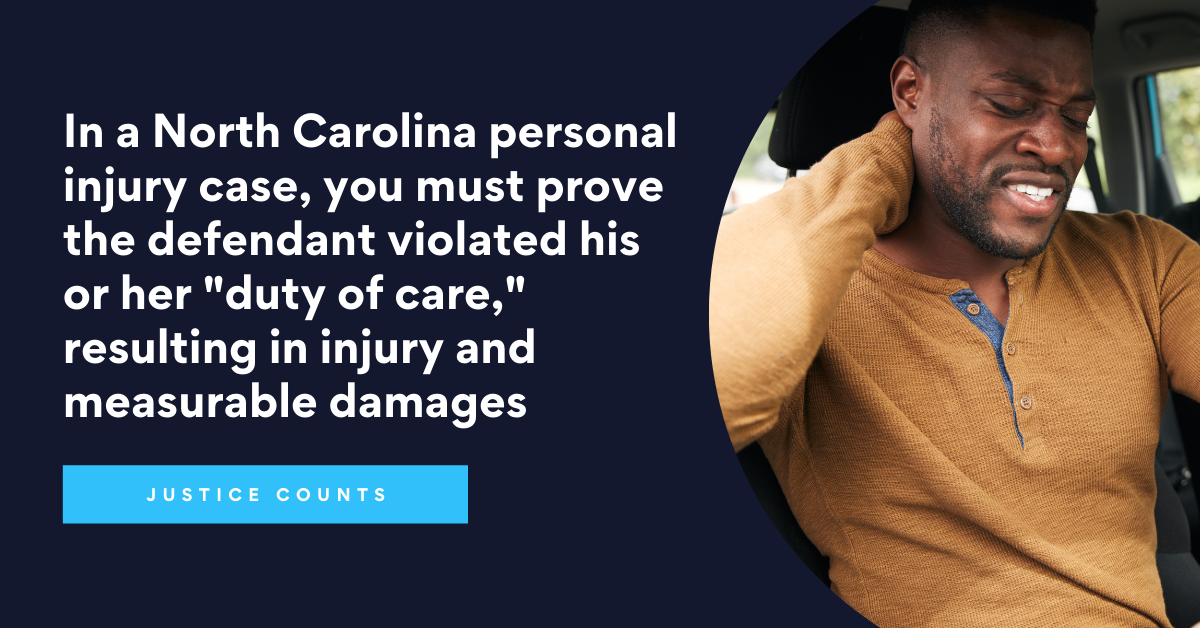Riddle & Riddle Injury Lawyers | July 6, 2021 | Personal Injury

To recover damages in a North Carolina personal injury case, you have to prove that a negligent party had an obligation to avoid acting in a way that exposed you to a risk of injury. Examples include the obligation to drive safely, or to keep their property free from hazards. You also have to prove that the allegedly negligent party failed to meet that obligation, that their failure was the direct and proximate cause of your injuries, and that you suffered financial losses as a result of those injuries.
For more than 35 years, Riddle & Riddle has helped injured North Carolina residents recover just compensation for injuries caused by someone else’s negligence. If you have been seriously hurt and you believe that another party may be to blame, call us at 1-800-525-7111 for a no-obligation consultation with a North Carolina personal injury attorney who can explain how we can help you.
What Information Does a Personal Injury Lawyer Use to Prove Negligence?
The facts and evidence that your personal injury lawyer will use to prove another party’s negligence in your case may include:
- Photographs and video of accident scenes
- Police reports
- Eyewitness statements
- Maintenance and inspection records
- Hospital records and physicians’ diagnoses of injuries
- Medical bills and other proof of an injured party’s expenses
- Expert analysis and forensic reconstruction of accidents
In one recent case, we even used data from Google maps as evidence to show how fast traffic was moving when a car accident happened. We recovered $9.45 million in total compensation for our client by using that evidence and other information about the wreck (see disclaimer below).
Call us at 1-800-525-7111 if you have questions about your car accident, slip and fall case, or any other matter where someone else’s carelessness left you with property losses and injuries. We will give you simple and straightforward answers to your questions along with an assessment of your opportunity to recover damages in a personal injury lawsuit.
What Damages Can You Recover If You Prove Your Personal Injury Case?
If you have been hurt, for example, in a car accident, you may be eligible to recover more damages than just the value of your car and your immediate medical expenses following the accident. We can examine the full extent of your losses and help you recover:
- Ongoing and future medical expenses stemming from your injury
- Costs of physical and occupational therapy
- Reimbursement of wages you lose when your injuries keep you from working
- Compensation for your pain and suffering, mental anguish, and loss of companionship with your spouse or companion and your family
Responding to Lowball Offers

The insurance companies that are responsible for paying out settlements after an accident might make a quick offer to settle your case for an amount that is far below what it is worth. Call us at 1-800-525-7111 before you talk to an insurance company representative or sign any documents that an insurer asks you to sign. We will look at the facts and evidence in your case to determine the true value of your losses and can negotiate on your behalf with the insurer to make sure you get the settlement you deserve.
At Riddle & Riddle, we strongly believe that Justice Counts for every injured North Carolina resident, and we will fight tirelessly to use the facts and evidence of your accident to prove your right to recover the largest available damages award. Contact us for a free consultation and let us see how we can help you.
“[Riddle & Riddle] increased my final settlement payment by 33 percent.”
-Charles Humphrey, Riddle & Riddle client
*Disclaimer: The results mentioned are intended to illustrate the type of cases handled by the firm. These results do not guarantee a similar outcome, and they should not be construed to constitute a promise or guarantee of a particular result in any particular case. Every case is different, and the outcome of any case depends upon a variety of factors unique to that case.
Contact a Personal Injury Lawyer from Riddle & Riddle Injury Lawyers for Help Today
For more information, please contact Riddle & Riddle Injury Lawyers to schedule a free consultation with a personal injury lawyer in North Carolina today. We have twelve convenient locations in North Carolina, including Greenville, Raleigh, Goldsboro, Jacksonville, Kinston, Charlotte, Greensboro, Durham, Fayetteville, Wilmington, Winston-Salem & Garner.
Riddle & Riddle Injury Lawyers – Raleigh Office
4600 Marriott Dr STE 500, Raleigh, NC 27612
(919) 876-3020
Riddle & Riddle Injury Lawyers – Charlotte Office
1914 J N Pease Pl Suite 142, Charlotte, NC 28262
(704) 486-5824
Riddle & Riddle Injury Lawyers – Durham Office
100 E Parrish St STE 200, Durham, NC 27701
(919) 728-1770
Riddle & Riddle Injury Lawyers – Garner Office
500 Benson Rd Suite 111, Garner, NC 27529
(800) 525-7111
Riddle & Riddle Injury Lawyers – Greensboro Office
7B Corporate Center Ct Suite 15, Greensboro, NC 27408
(336) 516-9066
Riddle & Riddle Injury Lawyers – Greenville Office
300 E Arlington Blvd Suite 2A #110, Greenville, NC 27858
(252) 397-8620
Riddle & Riddle Injury Lawyers – Goldsboro Office
601 N Spence Ave, Goldsboro, NC 27534
(919) 778-9700
Riddle & Riddle Injury Lawyers – Jacksonville Office
3391 Henderson Dr, Jacksonville, NC 28546
(910) 455-5599
Riddle & Riddle Injury Lawyers – Kinston Office
807 N Queen St, Kinston, NC 28501
(252) 397-8624
Riddle & Riddle Injury Lawyers – Fayetteville Office
2517 Raeford Rd, Fayetteville, NC 28305
(910) 387-9186
Riddle & Riddle Injury Lawyers – Wilmington Office
1608 Queen St Suite 12, Wilmington, NC 28401
(910) 889-4064
Riddle & Riddle Injury Lawyers – Winston-Salem Office
102 W 3rd St, Ste 1007, Winston-Salem, NC 27101
(336) 516-9042
